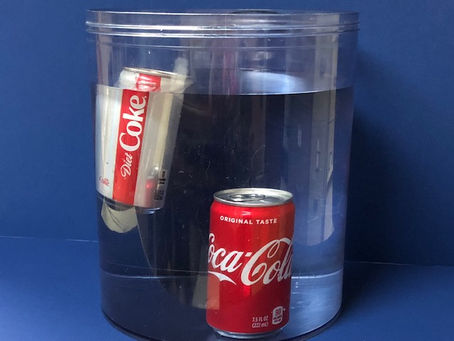top of page
Search


It’s just a typo
You pull up in front of a school and the sign out front advertises an upcoming event as follows: Leteracy Night Dec 8th at 5:00 Would...

Barbara Mayfield, MS, RDN, LD, FAND
Nov 22, 20193 min read


Are you ready when the media calls?
Imagine sitting in your office concentrating on completing your latest project when the phone rings. It is the producer for your local...

Barbara Mayfield, MS, RDN, LD, FAND
Nov 15, 20192 min read


5 Tips for Reaching and Teaching Adults
If you want to learn something, what do you do? Do you… Look it up online? Watch a YouTube video? Go to the library and check out a book?...

Barbara Mayfield, MS, RDN, LD, FAND
Oct 11, 20192 min read


Miss Perception - What does it mean?
Meet Miss Perception, also known as “Did I hear or read that correctly?” Miss Perception is a contestant in my “Mis-Communication”...

Barbara Mayfield, MS, RDN, LD, FAND
Aug 23, 20193 min read


The Power of Story in Live Video
Think back to the last product you purchased. For me, it was a new planner from someone on social media. Did I truly need another fancy...

Guest post by Katie Hake, RDN, LD
Aug 16, 20193 min read


What makes a message compelling?
What does it take to be compelling? To compel means to bring about something forcefully, but to be compelling has a much more desirable...

Barbara Mayfield, MS, RDN, LD, FAND
Aug 9, 20193 min read


What makes a message memorable?
As communicators, we won’t be effective if an audience can’t remember our message. Being memorable is essential to successful communication. What do we know about memory, and how can we use that knowledge to make communication memorable?

Barbara Mayfield, MS, RDN, LD, FAND
Jul 19, 20193 min read


What is your social media ROI?
On the first day of class, when I asked the students in our Nutrition Communication course at Purdue to share why they had picked their...

Barbara Mayfield, MS, RDN, LD, FAND
Jun 28, 20193 min read


Am I making myself clear?
Recently, my husband had a medical test in which the result read: “The trachea bronchial tree and esophagus are grossly unremarkable.” In...

Barbara Mayfield, MS, RDN, LD, FAND
May 31, 20193 min read


Don’t be Mr. E
Who is Mr. E and why shouldn’t I be him? Good question. He is the guest contestant in the “ Miss Communication ” pageant. In this...

Barbara Mayfield, MS, RDN, LD, FAND
May 10, 20193 min read


Be brief, or not?
When I ask audiences to select their top challenge in creating effective messages, what do you think they pick? Being more...

Barbara Mayfield, MS, RDN, LD, FAND
Apr 26, 20192 min read


How do you craft words that work?
Communicating effectively is a challenge. Miscommunication is rampant – we misunderstand, misinterpret, misspell, mispronounce, and more....

Barbara Mayfield, MS, RDN, LD, FAND
Apr 12, 20192 min read


And the name is…
Similar to creating a baby, books have a long gestation period before they “arrive.” In fact, this book will have taken longer than three...

Barbara Mayfield, MS, RDN, LD, FAND
Mar 29, 20193 min read


Seeing is believing
On a clear evening as the sun sets over the horizon, you just might be able to experience a phenomenon known as the “green flash.” It is...

Barbara Mayfield, MS, RDN, LD, FAND
Feb 15, 20192 min read


Do your presentations sink or swim? Bring visual aids to the rescue!
What do you think is illustrated with the visual aid depicted in the photo? Did you guess BMI (Body Mass Index)? How can I use a visual...

Barbara Mayfield, MS, RDN, LD, FAND
Sep 28, 20184 min read


Take your presenting from good to great
Presentation skills are essential in today’s workplaces, organizations, and via digital channels. Whether you present in person or...

Barbara Mayfield, MS, RDN, LD, FAND
Aug 24, 20182 min read


The Making of a Model
How would you illustrate nutrition communication? The first chapter in Communicating Nutrition: The Authoritative Guide introduces the...

Barbara Mayfield, MS, RDN, LD, FAND
Jul 13, 20183 min read


Can you answer that?
The Q&A can be one of the most dreaded parts of a presentation. Why? Because we fear we might not know how to respond to a difficult...

Barbara Mayfield, MS, RDN, LD, FAND
May 11, 20183 min read


5 ways to stand out from the crowd
Did you know that the average consumer is exposed to as many as 10,000 brand messages each and every day? That’s what the American...

Barbara Mayfield, MS, RDN, LD, FAND
Mar 2, 20182 min read


Do you accept or reject?
When we block the ideas of others we stop the flow of ideas. When we accept the ideas of others we keep the ideas flowing and agree to save the evaluation for later. In improv this is called “accepting offers.” It enhances collaboration and problem solving.

Barbara Mayfield, MS, RDN, LD, FAND
Dec 15, 20172 min read
bottom of page
